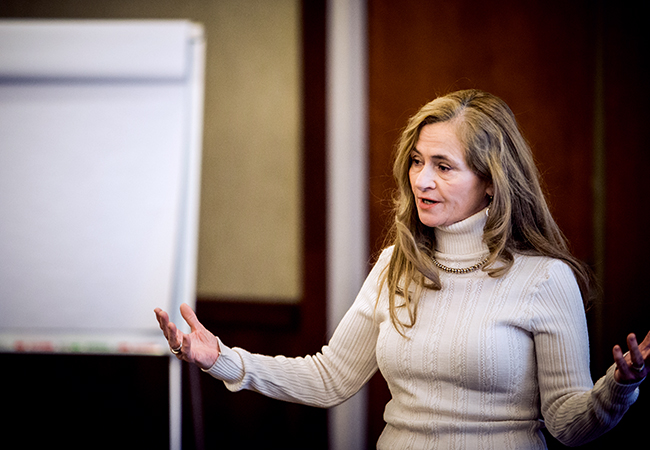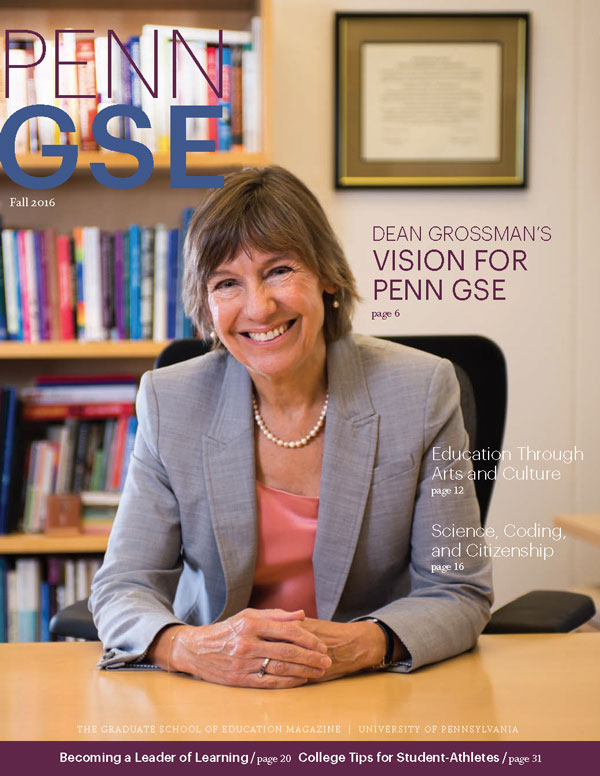Becoming a Leader of Learning: The Life of a PennCLO Student
by Kathy Boccella
When Karen Bicking enrolled in the PennCLO (Chief Learning Officer) Executive Doctoral Program at Penn GSE, she expected to gain valuable wisdom on learning in the workplace, knowledge that would inform her human resources role at New Jersey-based Bayer HealthCare. She never expected she would have a chance to write poetry.
Bicking was more than a little surprised when a singer-songwriter showed up at her class on the last day of a two-week course session. The students’ assignment: interview a classmate about his or her childhood and summarize the answers in a poem, which the musical artist would perform before the amused classroom.
“That was an example of how to create a climate for creativity and learning,” says Bicking, a human resource partner at Bayer. The musical flourish was a finale to the rigorous program’s unit on learning theories—such as cognitive, behavioral, and sociocultural. According to PennCLO Program Director and Senior Fellow Annie McKee, the exercise is just one example of the program’s dynamic approach to developing leaders who foster growth in employees.
“The need to create cultures where people can be at their best—where they can learn, adapt, try new things, and take risks without fear of losing their jobs—is something that companies are taking seriously, and we are preparing students to meet this need,” Dr. McKee says.
“The need to create cultures where people can be at their best—where they can learn, adapt, try new things, and take risks without fear of losing their jobs—is something that companies are taking seriously, and we are preparing students to meet this need.”
Workplace education is often managed at the highest levels by Chief Learning Officers (CLOs), and many other leaders also view it as a top responsibility. At a host of major companies, including American Express, The Ritz-Carlton, eBay, Procter & Gamble, Google, and more, PennCLO students and alumni tackle a range of challenges in employee training, talent recruitment, and organizational culture.

For Bicking, the program is cultivating vibrant new perspectives, as well as knowledge that is already benefiting her career.
A Practical Approach
At a recent class session, Bicking and twenty-two of her classmates grabbed a quick breakfast from a buffet and opened up their laptops for an 8:30 a.m. class taught by Penn GSE Senior Lecturer Sharon Ravitch. The students listened intently as Dr. Ravitch described her work in qualitative research methods, which involves international research and education projects in places such as India, Nicaragua, and Haiti.
The class was part of a curriculum unit, or “course block,” on evidence-based decision-making, which prepares students to conduct, analyze, and apply research. Such skills will allow them to study, evaluate, and improve their organizations’ approaches to learning and talent development.
“For me, research is a tool for transformation,” says Ravitch, co-academic director of the block. “Once people learn the conceptual frameworks and technical skills to conduct research and to lead others in conducting research, they can gather the information they need to advocate for change.”
Ravitch’s focus on connecting research and practice is typical of the program, Bicking notes. “The program’s mix of theoretical and practical learning helps you see how you can put new ideas to work right away,” she says, pointing to a project in which students were asked to research an emerging technology and then write up a business case for using it.
A midcareer executive with roughly two decades of experience in human resources, Bicking has promptly incorporated her new knowledge into her work at Bayer, recommending changes to her company’s peer mentoring program and becoming more involved in corporate strategy making. “We’re developing a more strategic outlook toward people management,” says Bicking, who joined the pharmaceutical giant about two years ago after a lengthy stint at rival Johnson & Johnson. “I’m bringing back new approaches that are helping us meet our goals for talent development and diversifying the workforce, all of which will contribute to building our brand.”
For Bicking, the program’s executive format is another example of its practicality. Two-week course sessions are offered on Penn’s campus three times during the year, featuring professors from GSE, the Wharton School, and other Penn schools, as well as learning and development practitioners from around the globe. Students complete six such sessions, along with distance learning, field excursions, and a dissertation.
The format allows Bicking to earn her Ed.D. degree without significantly interrupting her career or family life. “I researched traditional doctoral programs. A lot of them are full-time, multiple years. That’s not an option in my life,” says Bicking, who is raising two young sons at her home in Bridgewater, New Jersey. She plans to earn her degree over three years, as is typical for PennCLO students.
Broadening Perspectives
As students introduced themselves to Ravitch at the class session, it was clear that they would bring their skills to an array of geographical and organizational settings. “I didn’t realize how varied my classmates’ backgrounds would be,” says Bicking. “The diversity adds another dimension to the learning.”
Students told Ravitch they had come to the program from as far away as Mexico, Nigeria, and the Netherlands. Although some were corporate human resource and learning executives like Bicking, others described careers in the military, in medicine, for private equity firms, or as entrepreneurs.

One student, U.S. Army Capt. James Height, is the director of human resources at the NATO School in Oberammergau, Germany, which trains soldiers from twenty-five European nations and elsewhere. Height says his interest in best learning practices stemmed from his work teaching human resources skills to the Afghan National Security forces.
“At that time I began to see the importance of training,” he says. “It really does save lives.” For his trainees in Afghanistan, he said, an unexplained absence could mean that an employee had defected to the enemy Taliban—not your typical HR problem, and one requiring a coordinated response.
In the PennCLO program, Height reports, he is gaining a broad perspective on leading learning in the workplace. “It’s not just about securing resources and making missions happen—it’s about looking out for the best interests of your people, motivating your people, and making sure they’re competitive wherever they go,” he says. Another student, Jane Kim, is an emergency medical physician at Kings County Hospital in Brooklyn, New York, and a medical simulation director for the State University of New York Downstate Medical Center. She says the PennCLO Program will help her train doctors and nurses to better respond during a catastrophe. “There are so many gaps that I’ve noticed in medical professionals’ learning after their formal training and residency are over,” Kim says. “This is the perfect opportunity for me to create new programs and put them into practice.”
As Bicking looks ahead, she sees exciting possibilities. She cites the PennCLO course block about technology as another illustration of the program’s power to broaden her horizons. Through an exploration of educational computer simulations and games, students learned how technology can improve learners’ comprehension and collaboration. “It was an example of leveraging technology to enhance learning,” she says.
That kind of innovative thinking is at the heart of both learning and leadership itself, according to McKee. “By expanding students’ understandings of the many ways people learn, we help them become leaders who inspire and motivate people to do their best work,” she says.
This article originally appeared in the Fall 2016 issue of The Penn GSE Magazine.

